

Lord David Cameron อดีตนายกรัฐมนตรีคนที่ 53 แห่งสหราชอาณาจักร และรัฐมนตรีว่าการกระทรวง การต่างประเทศแห่งสหราชอาณาจักร พร้อมด้วย นางสาวศุภมาส อิศรภักดี รัฐมนตรีว่าการกระทรวงการศึกษาระดับอุดมศึกษา วิทยาศาสตร์ การวิจัยและนวัตกรรม (อว.) เข้าเยี่ยมชมห้องแล็บวิจัยด้านการพัฒนาผลิตภัณฑ์เทคโนโลยีชีวภาพและชีววิทยาสังเคราะห์ ณ บริษัท ไบโอม จำกัด อาคารมหาวชิรุณหิศ (ชั้น11) คณะวิทยาศาสตร์ จุฬาลงกรณ์มหาวิทยาลัย โดยมี ศาสตราจารย์ ดร. อลิสา วังใน Chief Technology Officer ของบริษัท ไบโอม จำกัด ให้การต้อนรับ ซึ่งบริษัทไบโอม เป็นบริษัทร่วมทุนระหว่างจุฬาฯ และบริษัท บีบีจีไอ จำกัด (มหาชน) (BBGI) ที่ได้วิจัยและพัฒนาด้านเทคโนโลยีชีวภาพแห่งแรก
ด้าน นายกิตติพงศ์ ลิ่มสุวรรณโรจน์ ประธานเจ้าหน้าที่บริหาร BBGI กล่าวว่า พร้อมผนึกความแข็งแกร่ง ร่วมต่อยอดสร้างมูลค่างานวิจัยกับทางจุฬาลงกรณ์มหาวิทยาลัยเพื่อเสริมฐานผู้นำอุตสาหกรรมกลุ่มผลิตภัณฑ์ชีวภาพมูลค่าสูงในภูมิภาคเอเชีย ในการวางเป้าหมายใช้ไทยเป็นฐานในการส่งต่องานวิจัยผลิตภัณฑ์ชีวภาพมูลค่าสูง สู่การใช้ประโยชน์เชิงพาณิชย์ไปยังตลาดโลก
นอกจากนี้ BBGI ยังได้รุกธุรกิจผลิตผลิตภัณฑ์ชีวภาพที่มีมูลค่าสูง (CDMO) ผ่านความร่วมมือกับพันธมิตรระดับโลก ภายใต้บริษัทร่วมทุน BBFB (BBGI Fermbox Bio) ซึ่งเป็นโรงงานเทคโนโลยีชีวภาพขั้นสูง (Precision Fermentation) เชิงพาณิชย์แห่งแรกของภูมิภาคเอเชียตะวันออกเฉียงใต้และประเทศไทย คาดโรงงานแล้วเสร็จในช่วงต้นปี 2568 นับเป็นการตอกย้ำ BBGI แข็งแกร่งเตรียมพร้อมสู่โอกาสในอนาคต
คณะวิทยาศาสตร์ มหาวิทยาลัยมหิดล ร่วมกับบริษัท เอสซีจี เคมิคอลส์ จำกัด (มหาชน) หรือ SCGC ธุรกิจเคมีภัณฑ์เพื่อความยั่งยืน ผนึกกำลังจัดงาน SCGC-Mahidol Science Symposium: “Healthcare, Well-being & Sustainability” เดินหน้าความร่วมมือสร้างสรรค์งานวิจัยเชิงพาณิชย์ ผลักดันนวัตกรรมเพื่อสุขภาพ ความเป็นอยู่ที่ดี และความยั่งยืนให้กับผู้คนทั้งในประเทศไทยและระดับสากล
ตอบรับเมกะเทรนด์ ภายในงานได้มีการลงนามบันทึกความร่วมมือ Research and Innovation for the Future Materials โดยรองศาสตราจารย์ ดร.พลังพล คงเสรี คณบดีคณะวิทยาศาสตร์ มหาวิทยาลัยมหิดล และดร.สุรชา อุดมศักดิ์ รองผู้จัดการใหญ่ และประธานเจ้าหน้าที่สายงานนวัตกรรม SCGC ณ ห้องประชุมอาคารสตางค์ มงคลสุข พญาไท คณะวิทยาศาสตร์ มหาวิทยาลัยมหิดล โดยมีทีมผู้บริหารจากคณะวิทยาศาสตร์ มหาวิทยาลัยมหิดล รองศาสตราจารย์ ดร.วีระชัย สิริพันธ์ วราภรณ์ รองคณบดี และ ศาสตราจารย์ ดร.ฤทัยวรรณ โต๊ะทอง รองคณบดีฝ่ายวิจัยและวิเทศสัมพันธ์ และ รองศาสตราจารย์ ดร.ณัฏฐวี เนียมศิริ ผู้ช่วยคณบดี พร้อมทั้งทีมผู้บริหารจาก SCGC นายนิวัฒน์ อธิวัฒนานนท์ ผู้อำนวยการเทคโนโลยี SCGC และ ดร.สุเมธ เจริญชัยเดช หัวหน้าศูนย์วิจัยและพัฒนา SCGC เข้าร่วมงาน
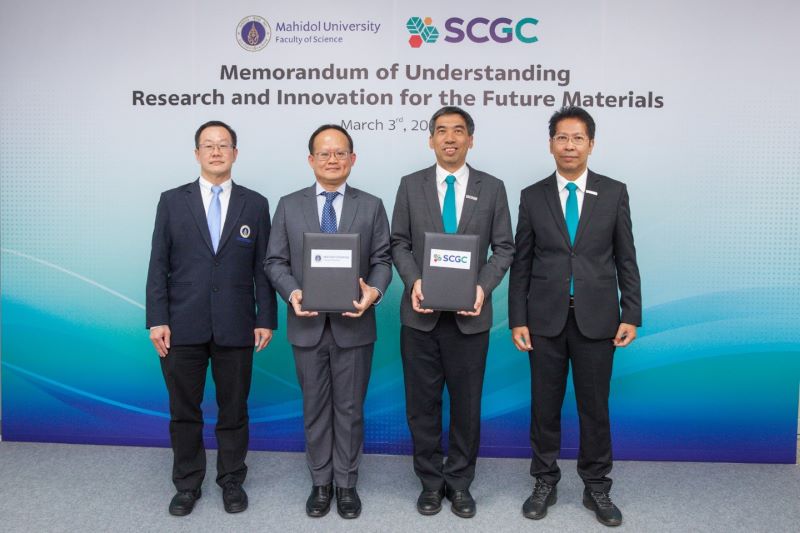
คณะวิทยาศาสตร์ มหาวิทยาลัยมหิดล และ SCGC ได้ร่วมมือทางวิชาการตั้งแต่ปี พ.ศ. 2550 พร้อมทั้งได้จัดตั้ง “ศูนย์วิจัยนวัตกรรม SCG-MUSC Innovation Research Center” ขึ้นในปี 2562 ณ อาคารเคมี คณะวิทยาศาสตร์ มหาวิทยาลัยมหิดล เพื่อพัฒนาพอลิเมอร์ชนิดพิเศษ โดยใช้องค์ความรู้ในศาสตร์เคมีเชิงลึกของมหาวิทยาลัยมหิดล ประสานกับเทคโนโลยีชั้นนำระดับสเกลอัปเชิงอุตสาหกรรมของ SCGC เพื่อต่อยอดในการสร้างวัสดุและผลิตภัณฑ์แห่งอนาคต
สำหรับความร่วมมือในครั้งนี้ เป็นการขยายขอบเขตความร่วมมือให้ครอบคลุมถึงนวัตกรรมด้านสุขภาพเพื่อความเป็นอยู่ที่ดี (Healthcare & Well-being) และความยั่งยืน (Sustainability) โดยยังคำนึงถึงหลักเศรษฐกิจหมุนเวียนเพื่อแก้ไขวิกฤตการณ์ขาดแคลนทรัพยากร ซึ่งจะช่วยยกระดับคุณภาพชีวิต และสร้างความยั่งยืนในอุตสาหกรรมเคมี รวมถึงส่งเสริม Open Innovation ผ่านความร่วมมือของสถาบันการศึกษาและภาคเอกชน (Public-Private Partnership) ที่ประสานความเข้มแข็งขององค์กรพันธมิตรเข้าด้วยกัน เพื่อร่วมวิจัยและพัฒนานวัตกรรมทางวิทยาศาสตร์และเทคโนโลยี ให้สอดคล้องกับเมกะเทรนด์โลก นอกจากนี้ยังเป็นการสร้างผู้เชี่ยวชาญและนวัตกรรุ่นใหม่ที่มีความรู้ความสามารถทางวิทยาศาสตร์ เพื่อคิดค้นนวัตกรรมที่ช่วยยกระดับคุณภาพชีวิตผู้คนได้อย่างมีประสิทธิภาพและยั่งยืนต่อไปในอนาคต
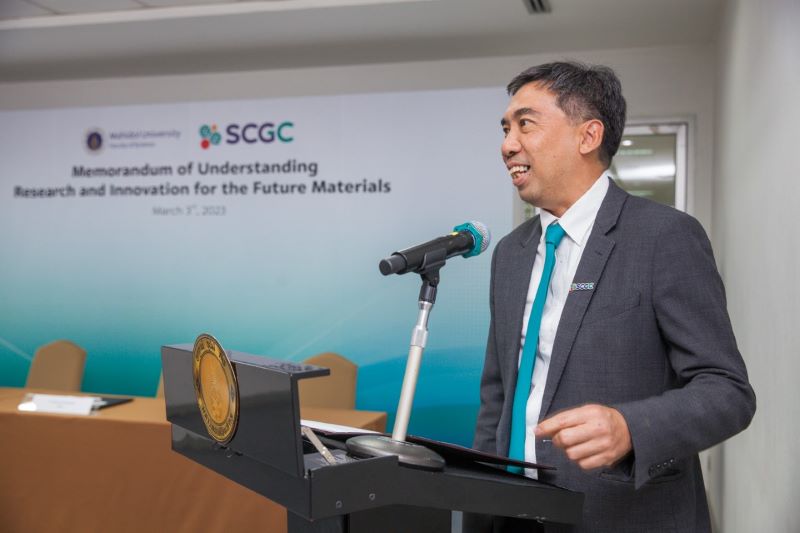
ดร.สุรชา อุดมศักดิ์ รองผู้จัดการใหญ่ และประธานเจ้าหน้าที่สายงานนวัตกรรม SCGC กล่าวว่า “ SCGC มุ่งสร้างสรรค์นวัตกรรมเคมีภัณฑ์เพื่อช่วยพัฒนาคุณภาพชีวิตของผู้คนให้ดียิ่งขึ้น ควบคู่ไปกับการดูแลสังคมและสิ่งแวดล้อมอย่างยั่งยืน สามารถตอบโจทย์ความต้องการของลูกค้าได้อย่างแท้จริง โดยนำหลักเศรษฐกิจหมุนเวียนและเมกะเทรนด์มาเป็นแนวทางในการพัฒนานวัตกรรมสินค้าและบริการ โดย SCGC ยังคงเดินหน้าขับเคลื่อนนวัตกรรมผ่านการสร้างเครือข่ายด้าน R&D กับองค์กรและสถาบันชั้นนำทั้งในประเทศและระดับโลก เพื่อวิจัยและพัฒนานวัตกรรมสินค้ามูลค่าเพิ่มสูง หรือ HVA (High Value Added Products & Services) อย่างต่อเนื่อง สำหรับการลงนามความร่วมมือด้าน “Research and Innovation for the Future Materials” ระหว่าง SCGC กับ คณะวิทยาศาสตร์ มหาวิทยาลัยมหิดล ในครั้งนี้ เป็นการยกระดับและขยายกรอบการพัฒนางานวิจัยและนวัตกรรม ครอบคลุมทั้งหมด 3 ด้าน ประกอบด้วย 1) การวิจัยพัฒนาพอลิเมอร์ชนิดพิเศษที่เป็นมิตรกับสิ่งแวดล้อม เช่น การพัฒนาสารประกอบเพื่อเพิ่มประสิทธิภาพของตัวเร่งปฏิกิริยาให้ครอบคลุมการพัฒนาผลิตภัณฑ์ที่เป็นมิตรต่อสิ่งแวดล้อม หรือ Green Polymer โดยเน้นโซลูชัน 4 กลุ่มหลัก ได้แก่ Reduce, Recyclable, Recycle, Renewable 2) การวิจัยพัฒนาสินค้านวัตกรรมเพื่อสุขภาพ มุ่งเน้นการพัฒนาผลิตภัณฑ์เพื่อเสริมสร้างคุณภาพชีวิตให้กับผู้สูงอายุ ผู้ป่วยโรคเรื้อรังต่าง ๆ ให้มีความสะดวกสบายขึ้น และป้องกันหรือลดความเสี่ยงของการเกิดโรคและโรคอุบัติใหม่ และ 3) การวิจัยพัฒนาเพื่อลดการปล่อยก๊าซเรือนกระจกแบบครบวงจร โดยเริ่มตั้งแต่การลดของเสียและลดการปล่อยก๊าซคาร์บอนไดออกไซด์ในโรงงานอุตสาหกรรมปิโตรเคมี รวมถึงการเปลี่ยนก๊าซคาร์บอนไดออกไซด์โดยตรงให้เป็นสารเคมีที่ใช้ในอุตสาหกรรม ปิโตรเคมี หรือการนำสารตั้งต้นที่มีคาร์บอนฟุตพริ้นต์ต่ำมาผลิตเป็นผลิตภัณฑ์ต่าง ๆ ”
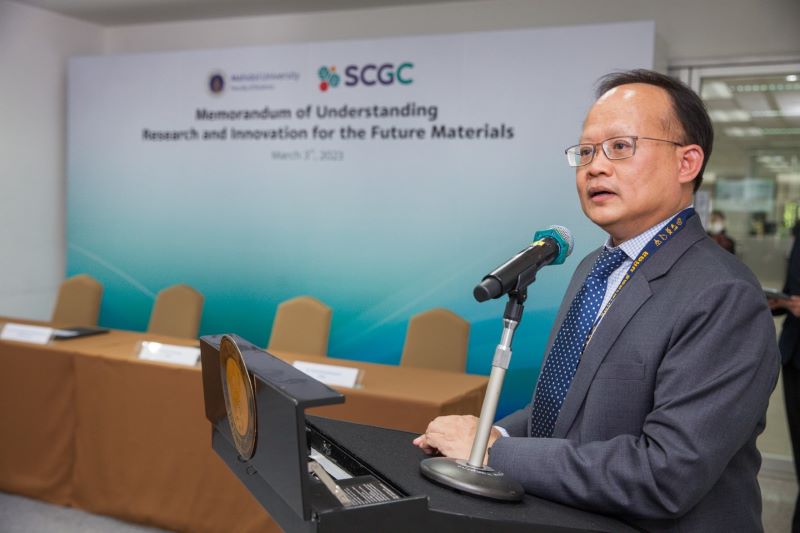
รองศาสตราจารย์ ดร.พลังพล คงเสรี กล่าวว่า “การจัดกิจกรรมในครั้งนี้ รวมถึงการลงนามต่ออายุข้อตกลงความร่วมมือ จะช่วยส่งเสริมความสัมพันธ์ที่แน่นแฟ้นขึ้นระหว่างบริษัท เอสซีจี เคมิคอลส์ จำกัด มหาชน (SCGC) และ คณะวิทยาศาสตร์ มหาวิทยาลัยมหิดล ในด้านการวิจัยและพัฒนานวัตกรรมร่วมกัน นำไปสู่การสร้างนวัตกรรมงานวิจัยที่ตอบโจทย์เศรษฐกิจ และส่งเสริมงานวิจัยเชิงพาณิชย์ให้กับประเทศไทย ซึ่งเพิ่มศักยภาพในการแข่งขันของประเทศในระดับสากล คณะวิทยาศาสตร์ มหาวิทยาลัยมหิดล เรามีอาจารย์และนักวิจัย ที่มีประสบการณ์และความเชี่ยวชาญด้านการวิจัยที่หลากหลาก โดยเฉพาะในสาขาวิทยาศาสตร์พื้นฐานและวิทยาศาสตร์การแพทย์ ที่ตรงกับความต้องการของ
ภาคเอกชน กิจกรรมครั้งนี้จึงถือเป็นจุดเริ่มต้นในการเพิ่มขยายความร่วมมือไปในด้านอื่น ๆ อาทิ ด้านนวัตกรรมด้านสุขภาพเพื่อความเป็นอยู่ที่ดี (Healthcare & Well-being) และความยั่งยืน (Sustainability) ทั้งยังเป็นโอกาสอันดีที่ในการแสดงผลงานวิจัยและนวัตกรรมของบุคลากรและนักศึกษาของคณะวิทยาศาสตร์ มหาวิทยาลัยมหิดล ที่ตอบโจทย์เศรษฐกิจหมุนเวียนและเมกะเทรนด์โลก และแลกเปลี่ยนมุมมองทางด้านงานวิจัยและนวัตกรรมต่าง ๆ กับทีมนักวิจัยของ SCGC เพื่อหารือต่อยอดความร่วมมือนำไปสู่การทำวิจัยร่วม รวมถึงการให้ทุนนักศึกษาในระดับบัณฑิตศึกษาในอนาคตอันใกล้นี้ นอกจากนั้น ยังเป็นการเปิดโอกาสให้บุคลากรและนักศึกษาได้พัฒนาแนวคิดต่อยอดสู่การผู้ประกอบการวิสาหกิจเริ่มต้น (Startup) ด้วย”
นอกจากนี้ ภายในงาน SCGC-Mahidol Science Symposium: “Healthcare, Well-being & Sustainability” ยังมีการ หารือต่อยอดความร่วมมือทางการวิจัยและนวัตกรรมระหว่างทีมนักวิจัยของ SCGC และคณาจารย์ผู้เชี่ยวชาญสาขาต่าง ๆ ของคณะวิทยาศาสตร์ มหาวิทยาลัยมหิดล อาทิ เคมี, เทคโนโลยีชีวภาพ, ฟิสิกส์, ชีวเคมี, วัสดุศาสตร์และนวัตกรรมวัสดุ, ยางและพอลิเมอร์, เภสัชวิทยา, สรีรวิทยา, กายวิภาคศาสตร์ รวมทั้งได้มีการนำเสนองานวิจัยต่างๆ เช่น การตรวจหาตัวบ่งชี้ทางชีวภาพ, การนำส่งยา, เอนไซม์, วัสดุและเซนเซอร์ ฯลฯ พร้อมเดินหน้าหารือความร่วมมือ และแลกเปลี่ยนองค์ความรู้ร่วมกับทีมนักวิจัยจาก SCGC อย่างเข้มข้น รวมถึงการให้ทุนนักศึกษาในระดับบัณฑิตศึกษาอีกด้วย
Prida Tangtrongchit, a director of the Thai Traditional Medicine at Wat PhraChettuphon Wimon Mangkhalaram (Wat Pho), an expert and a highly-respected pharmacist in the Traditional Thai Medicine (TTM), had indicated there are only 126-128 listed species in the Thai’s Ancient Medicine Textbook and there is an awful lot more of kingdom of plants and animals’ species that has yet to be discovered.
‘Traditional Thai Medicine (TTM)’ is focused on ‘natural therapy’ where body and mind function in harmony. Disharmony between the two will bring a distress to the body and that will cause ailments’, said Prida. All in all, the different ingredients from ‘Traditional Thai Medicine’ are meant to bring a harmony to the body’s elements inherent from mother’s earth’s sources: earth, water, wind, fire. These four elements must be kept in balance and it is the basis for Thai traditional healing.
Also, there are three basic ways to classify medicinal herbs: those taken internally, applied externally, and inhaled. Many, though, fall under two or even all three of these classifications. Herbal drugs can have from two to as many as 40 different ingredients, which are also classified by species and medicinal attributes.
Prida also explained that Thai herbal medicine can be effectively used to build and enhance our immune system since it is nature-derived. And we can prove it through gene sequencing.
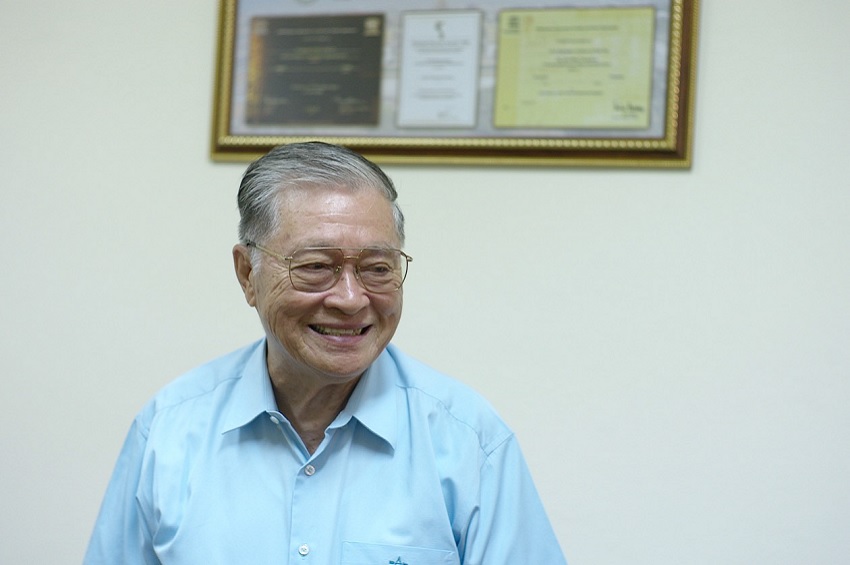
‘To eat well, to sleep well and to digest well will bring a harmony to life’, explained Dr. Prida.
‘Moreover, a harmony thus means that we (human and diseases) must live together in peace and will not trespass against each other. This is the way of the nature.
“And since nature is the creator of all things, she will always prevail”, said Prida.
Traditional Thai Medicine based its merits on ‘taste and flavor’ as having the healing properties through human’s sense, and where medicine be rendered in a variety forms of pill, dose, tablet, ointment, capsule, poultices, suppositories. Thai Traditional Medicine can also be used in forms of solutions by drinking teas, tonics, alcoholic macerates.
Thai cuisine has been famous for its flavors (as mentioned earlier that its merits on ‘taste and flavor’ as having the healing properties through human’s sense), is also known for its healing properties.
There are four basic flavors in Thai cooking—hot, salty, sweet, and sour. Restaurant or food street in Thailand are equipped with seasonings on the table while customers enjoy putting these seasonings from a little jar-pot of chilly, salt, sugar and lime to season their food according to their preferred tastes. Characteristic ingredients are fragrant lemon grass and lime leaves, hot spicy chilly, fish sauce and aromatic herbs. The different spices and herbal ingredients are meant to achieve a harmony of the body’s elements, serving as a proactive, a preventive and curative approach to heal symptoms and ailments.
For example: 1) A disharmony of the earth element may manifest as a disease of the organs, bones or muscles. 2) A disharmony of the water element may show symptoms such as urniary trouble, blood or lymph disease. 3) A disharmony of the air element may show as respiratory problems like bronchitis, dizziness, stiffness, arhtiritis. 4) A disharmony of the fire element may cause heart problems.
Thailand is located in the region known as ‘Indochina’ where it received medicinal knowledge from ancient countries from India and from China. From India, the ‘Ayurveda’ a combination discipline between arts and sciences, is based on maintaining a balanced flow of energy through meridians in the body also including the use of massage and herbal remedies. The Chinese has brought treatments like acupressure and acupuncture, as well a plethora of animal and herbal concoctions. Again, Chinese medicine and its treatments are based on the creation of harmony in human’s body (as Ying-Yang is the case in point).
Prida also said that Chinese medicine has undergone a rapid development after China became the ‘People’s Republic of China’ in 1949 due to the lack of access to world’s medicine after China closed its door to the world. China was pressured to invent new drugs to treat her people thus a research and development for Chinese medicine was heavily invested by the Chinese government to that effect.
Ancient Thailand must also have already been concocting Thai herbal remedies for healing. And through trial and error and through serendipity, ancient people in Thailand have found and learned the usefulness of herbal and animal properties to be used for healing ailments. Later on the settled farmers would systematically, through the obtained knowledge, begin to grow plant in their gardens for specific herbs and species. Thai Traditional Medicine thus has begun with ethno-practices having been performed by local healers, shamans, and midwives onwards. All in all, the practices have always been based on a holistic approach that focus on creating a ‘harmony’ from the four elements inherent from the Mother Earth’s sources (earth, water, wind, fire).
Prida said furthermore that traditional Thai medicine knows how to perform herbal concoctions to make active ingredients. Different species of herbs can also significantly be interchanged to make active ingredients.
As mentioned earlier, traditional Thai medicine recognizes herbal properties on the merits of taste or flavor since it is a primary consideration by flavor or taste that the healing properties of herbs are determined. Depending on its flavor or taste, herbs can increase a particular element and decrease others. Different tastes are as follows:

However, as it has mentioned earlier that Thai’s herbal medicine often places an emphasis on flavor and taste, the characteristic of these have somehow stalled a development of Thai herbs to move up to a higher stage.
We tend to lack the insight to really appreciate their undiscovered properties. ‘The lack to get to the insights of our herbal properties has created problems when ailments in our body have become drug-resistant, we need to look and study much more on this’, said Prida.
Last but not least, Prida quotes the famous saying from Shivago Komarpaj, the Ayurvedic practitioner who treated the Lord Buddha and is considered the father of Thai traditional medicine, ‘All plants are medicine’.
And as we have mentioned earlier that Thailand possess about 8-10% of micro-organisms of the entire world’s micro-organisms which creating kingdom of plants and animals, it is not an overstatement to say that Thailand’s biodiversity is the mother of all asset classes!.
Many believe that human is the toughest species on earth for a long time, we had fought through wars, plague and many deadly diseases but there is still one thing that we can’t defeat, i.e. cancer. Cancer is a fatal disease that has been known to kill humanity for centuries. We seem not to know how to successfully prevent and cure cancer due to the reason that every cancer patient has a distinct type of mutations within his/her tumor; thus it needs to be treated by a specific and precise medicine that doesn’t suit with everyone. However, with the 2018 Nobel Prize-awarded scientific findings and the discovery of modern medicine, it seems like there might be a cure for cancer after all.
Recently, MBA magazine got a chance to sit down with Dr. Trairak Pisitkun at Chulalongkorn University and talk about his Systems Biology Center. Dr. Trairak and his team have been developing an antibody drug that would help improve the ability of our own immune system to fight against cancer. Long before Dr. Trairak starting this project, he graduated from Mahidol University, Faculty of Medicine Ramathibodi Hospital in 1994, followed by specialized training in Internal Medicine and Nephrology. However, after working as a physician for a while, he felt like this was not enough for him; he wished that he could be doing something more than just following the guidelines for treating patients.
“I’ve realized that Thai doctors have been following guidelines from foreign doctors and I hope we could be doing something more innovative and more suitable for Thai people. Then again, by inventing innovations to help Thai people, I certainly need more knowledge in advanced science and technologies; so I decided to continue my career aboard as a researcher and scientist instead of a medical doctor”, Dr. Trairak said. He had been working at the National Institutes of Health or NIH in the United States of America for 9 years until he became a specialist in Systems Biology, Antibody R&D and Computational Biology. After moving back to Thailand 5 years ago, he has been working as Director of Center of Excellence in Systems Biology, Chulalongkorn University.
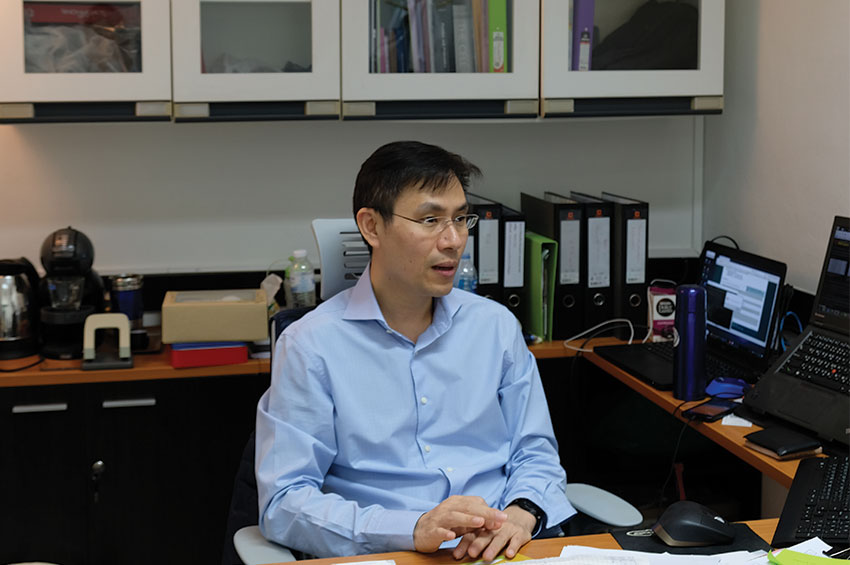
Currently, he has been developing an antibody drug to help Thai patients fight with cancer, before that he had been developing antibodies for basic research and diagnostic purposes. “Unintentionally, I’ve been invited to a closed group on social network for doctors and cancer patients who are interested in cancer immunotherapy. Every day, I would read stories of patients telling other people about their conditions and how it has miraculously gotten better after using the immune checkpoint antibody drug. It's incredible to perceive and, eventually, I was sold and desired to develop this type of medicine for Thai people using our antibody technology mainly because the extravagant cost, yet amazing efficacy, of this treatment”.
In America, Vice President Joe Biden has proposed a program called “Cancer Moonshot” during his Vice Presidency to support the research for curing cancer. By accelerating cancer research, the Cancer Moonshot program aims to make more effective therapies available to more patients, while also improving our ability to prevent cancer and detect it at an early stage. There have been cured cases in America by using immunotherapy which Dr. Trairak hoped that one day he and his team would be able to provide this kind of treatment for Thai people at an affordable price that would allow anyone to have access.
Instead of treating cancer by chemotherapy or radiation which would cause damages to other normal tissues and organs within our body, immunotherapy helps improve the ability of white blood cells and prevent cancer from blocking white blood cells to fight against them without damaging our body. After Dr. Trairak explains to us about the immunotherapy, we got a chance to ask him some questions that would help provide more understanding on the therapy and the plans that he has for Thai patients.
Is there a chance that we could use some kinds of gene sequencing analysis to help us know in advance or warn us that we have cancer?
There are some cases such as hereditary cancers that would allow us to predict in advance about whether we would have cancer, but there are only 8% chance of hereditary cancers. A majority of cancers are caused by somatic mutations; the likelihood that this will happen increases when we get older. This condition also depends on various exposures that we got from the environment such as food that we consume or chemicals to which we had been exposed. The current concept in cancer biology emphasizes that the sickening of the immune system is the cause of cancer progression. All of us always have a chance to get cancer, but it doesn't happen to everyone due to the defensive power of our immune system. By harnessing the natural defense, immunotherapy is effective and durable; moreover, it has fewer side effects than other types of cancer treatment.
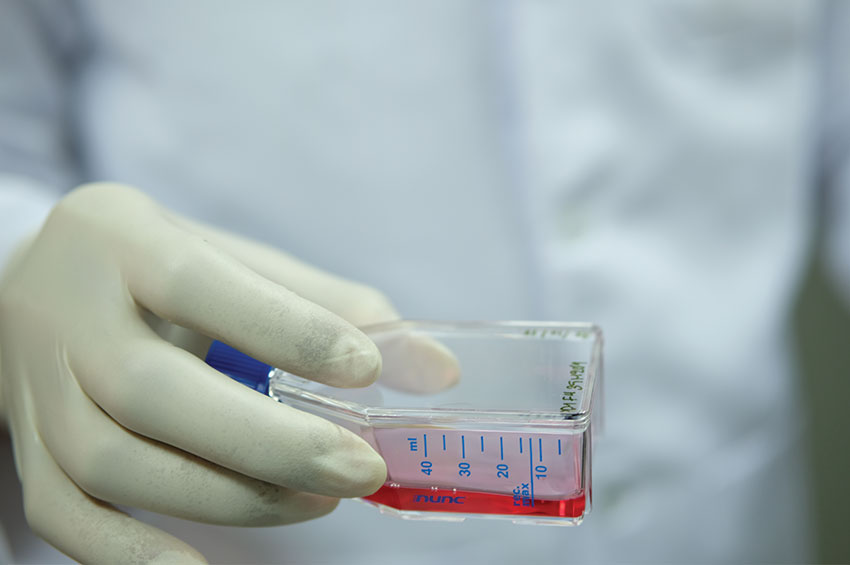
What’s the percentage of success?
With the current indications, the percentage of success is still moderate (20-30%) in advanced cancer patients that are using this antibody drug. But considering that this medicine has been out in public for only 4 years, I believe that the advance in immunotherapy research will further improve the outcome of this treatment substantially.
The Progress of Developing Medicine in Thailand
Dr. Trairak mentioned that his center is developing their own antibody drug. They generate the antibody drug by immunizing mice and later screening for antibody-producing white blood cell clones that would secrete the proper mouse antibodies (Phase 1). They have to modify the mouse antibodies to make them as close to human antibodies as possible to avoid other side effects that the medicine would have on the human (Phase 2). However, some processes would require technical assistance from the overseas laboratory as specific skills are lacking in Thailand. Currently, they have found a potential antibody drug prototype that would worth to pursue further and are waiting for the next step of the process (Phase 2) to start.
Right now, Dr. Trairak has started fundraising for the immunotherapy project by asking Thai people to donate 5 baht each to the project. He has hoped that the fund would rise to 200 million baht within 1 year to get to the large-scale production step (Phase 3). If everything has gone according to plan, the antibody prototype will be produced at large scale (Phase 3: 18-24 months) and then studied on animals first (Phase 4: 20-24 months) then he would move to experiment on human subjects (Phase 5: 48-60 months) before getting an approval by Thai FDA and distributing the medicine out to be sold in hospitals in Thailand with the aim of pricing at 20,000 baht per dosage, if possible. The entire process would require at least 8-10 years with the total budget of at least 1,500 million baht. Currently, the funding has reached over 100 million baht, and the funding is increasing every day with the hope that they would reach Phase 3 of the developing process by the end of next year.
Dr. Trairak also recommends that everyone could start preventing many types of sickness by starting regular exercise and controlling body weight from now on which would help make our immune system stronger and could possibly preventing cancer from growing. The "Thai version" antibody drug is still in the early developing stage, but from what we have learned from Dr. Trairak, we have realized that, with the advancement in immunotherapy, we have finally see the light at the end of the tunnel for cancer curing.
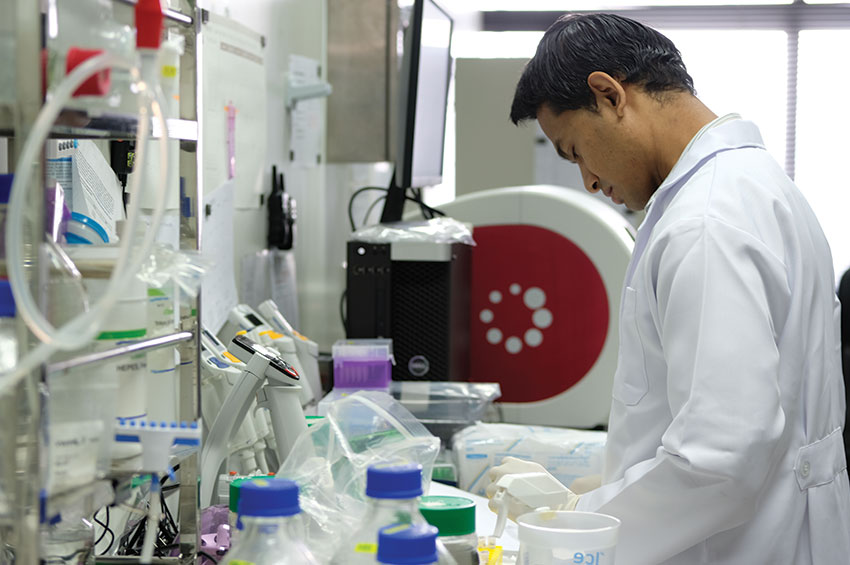
Everyone Deserves a Chance to Survive from Cancer: How to support and make this cancer-curing project comes true?
To make this medicine comes true for Thai cancer patients and contribute to the future endeavour of cancer immunotherapy research in Thailand, "Chulalongkorn Cancer Immunotherapy Excellence Center" open for donation with the following information:
408-004443-4 (saving account)
045-304669-7 (current account)
Bank: Siam Commercial Bank
Branch: The Thai Red Cross Society
Account name: Faculty of Medicine, Chulalongkorn University
Contact: https://www.facebook.com/CUCancerIEC/
Email: This email address is being protected from spambots. You need JavaScript enabled to view it.
Tel: 097-014-4978/ 088-902-2370/ 02-256-4183
Authors & Photos:
Pinploy Poonkham
Satida Pichanusakorn
ประเทศไทยอุดมสมบูรณ์ด้วยทรัพยากรธรรมชาติที่มีอยู่มากมาย ความหลากหลายทางชีวภาพของไทยเป็นต้นทุนสำคัญของประเทศอีกประการที่นอกจากเราจะผลิตสินค้าอาหารประเภทต่างๆ เลี้ยงชาวโลกได้แล้ว เรายังสามารถมีส่วนแบ่งในเรื่องไบโอเทคโนโลยีได้อีกด้วย